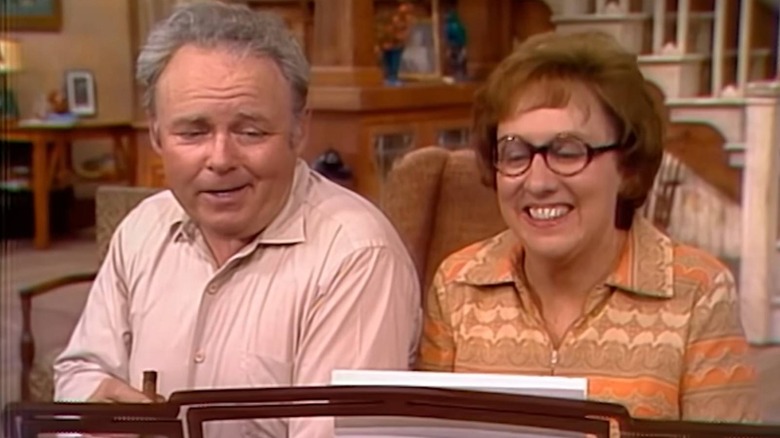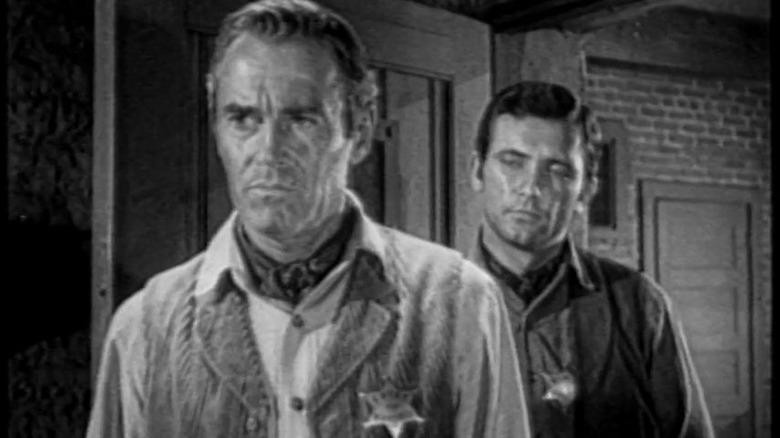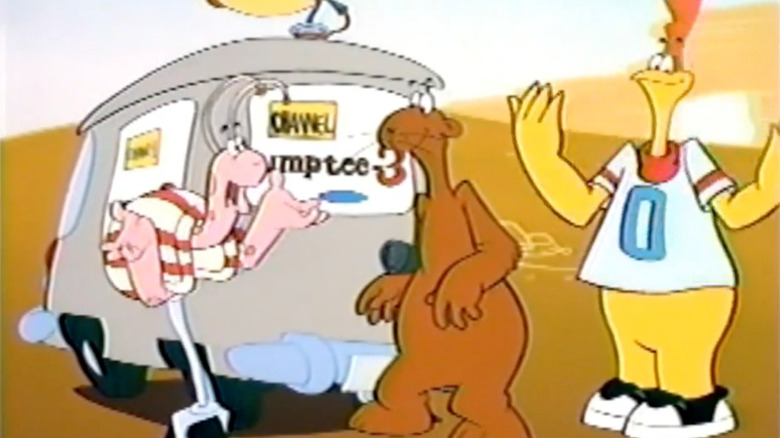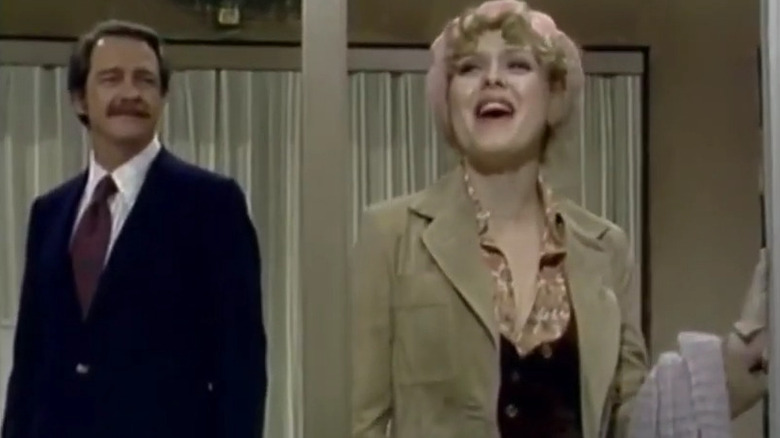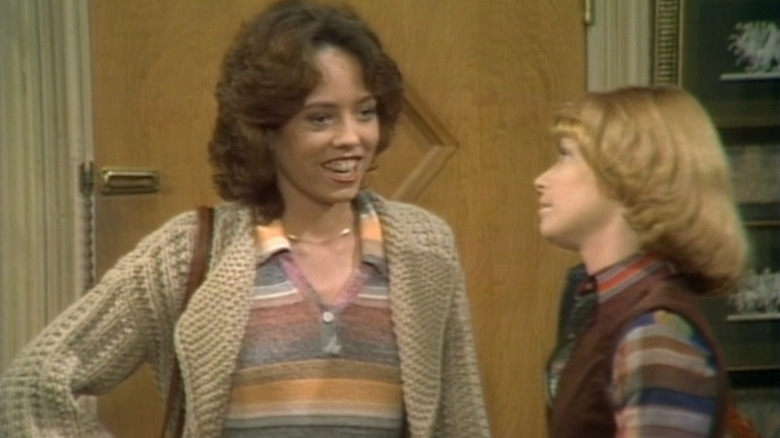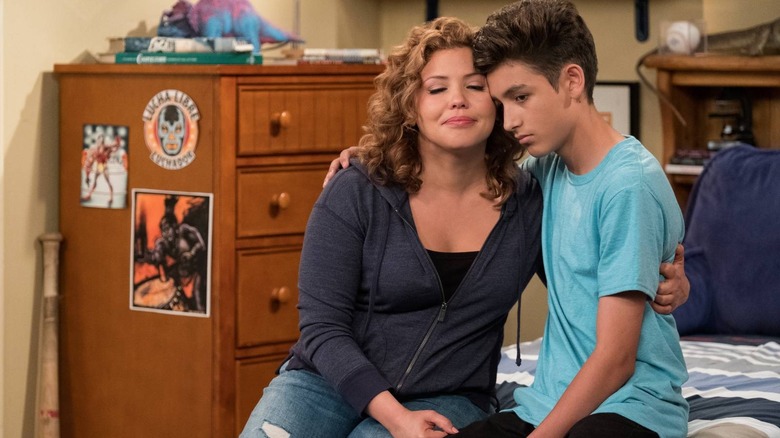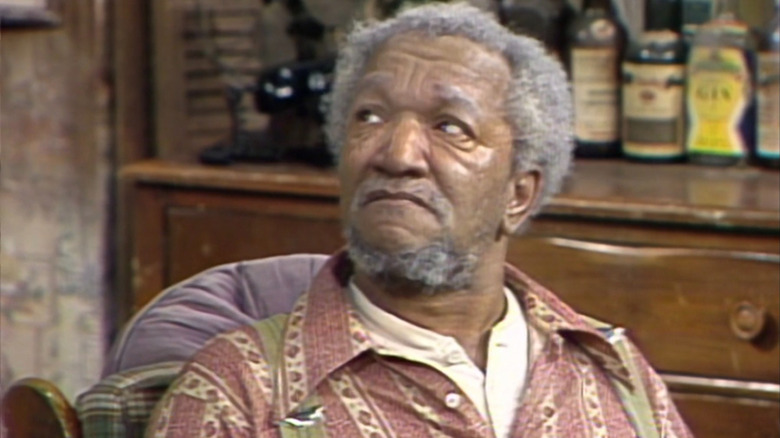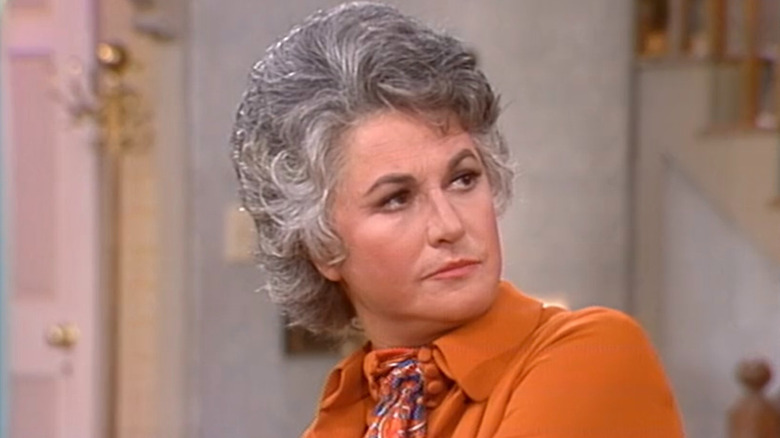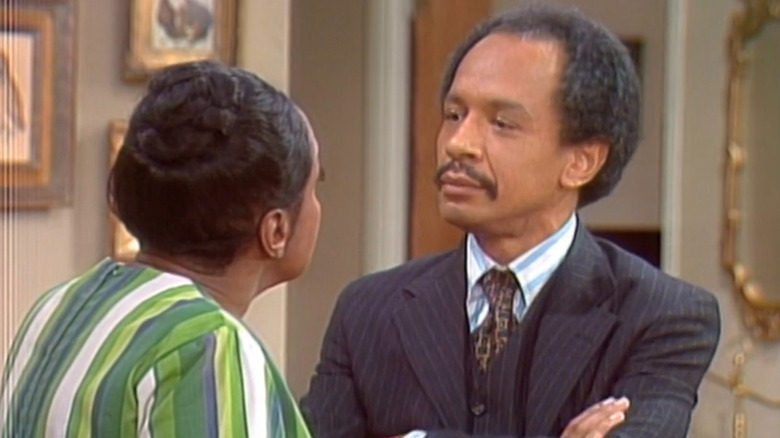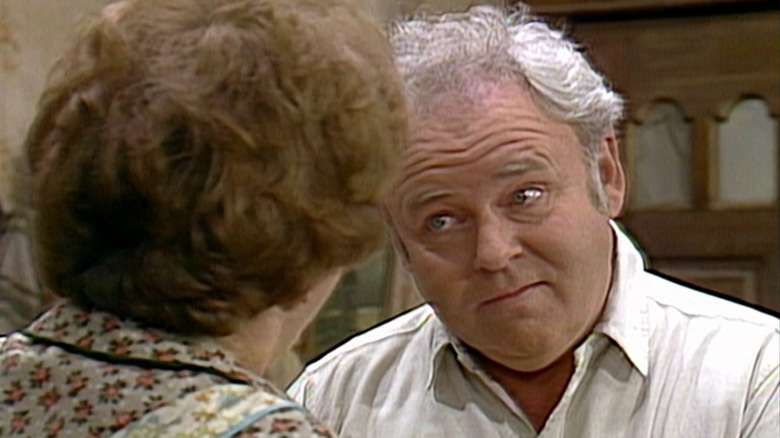12 Best Norman Lear TV Shows Ranked
When Norman Lear passed away in 2023 at the ripe old age of 101, he left behind an astounding legacy. He didn't just create a few television shows; he fundamentally altered what sitcoms were allowed to talk about. Sure, there were popular sitcoms before he really got going, like "I Love Lucy" and "The Honeymooners." They were pleasant escapes with silly characters who made funny jokes, occasionally touching on something more serious, like when "I Love Lucy" allowed a pregnant Lucille Ball to portray Lucy as such on the show.
But then you had series like "All in the Family" and "Maude" completely shattering what could and couldn't be said on TV. Characters didn't sidestep important issues; they reflected attitudes that viewers actually felt. All that being said, many of Lear's shows are downright hilarious. Anyone who considers themselves a TV connoisseur owes it to themselves to get a Lear education — and we can help, with our below ranking of Lear's 12 best TV shows.
12. The Deputy
"The Deputy" is certainly an outlier in Lear's filmography. It's a Western as opposed to a comedy that follows Chief Marshal Simon Fry (Henry Fonda) as he maintains the peace in a small town. While many Westerns of the era focused on action, "The Deputy" was more thoughtful in its approach to resolving conflict. It may be an entirely different genre, but one can see how Lear, who co-created the show, was already putting together the pieces of what would become common in his later projects.
"The Deputy" ran for 76 episodes from 1959 to 1961 and is worth watching for Lear fans because it helped set the template for what path he'd follow later in his career. When speaking of the show to Brown Political Review, Lear mentioned that the most important thing to come of "The Deputy" was what he learned from his much more experienced co-creator, Roland Kibbee: "He was like a father. He endorsed me for who I was and helped me to understand that the direction that I was on was OK, that I didn't have to become anybody different," Lear said.
11. Fernwood 2 Night
There have been plenty of talk show parodies over the years, from "The Larry Sanders Show" to the more modern "Eric Andre Show," the latter of which happens to be one of the best cringe comedies of all time. The format is so well-known that there are plenty of ways to subvert expectations, yet all of these shows owe a debt to "Fernwood 2 Night." It was actually a spin-off of another Lear show, "Mary Hartman, Mary Hartman," which was itself a parody of soap operas.
The show, starring Martin Mull and Fred Willard, featured nonsensical interviews, like a housewife who wanted her deceased aunt to become a saint due to her amazing raisin bread. For the second season, the show got rebranded to "America 2 Night" and moved from Ohio to California so that celebrities could appear as themselves. A few of the big names to appear included Mark Hamill, Charlton Heston, Carol Burnett, Rob Reiner, and Tom Waits. Between the dark comedy and celebrities willing to make fools of themselves, the show was way ahead of its time, and there's the question as to whether shows like "Comedy Bang! Bang!" could've existed without it.
10. Channel Umptee-3
"Channel Umptee-3" could be considered the forgotten middle child between "Animaniacs" and "Freakazoid." The kids' WB series saw a trio of critters travel around with a pirate television station called Channel Umptee-3. Each episode had some kind of lesson of the day, typically focusing on appreciating something most people take for granted, like sleep and cats, as the characters interacted with stock footage and sang songs.
Kids of the '90s may have foggy memories of the show. It only lasted 13 episodes, and it's pretty hard to track down these days (although you still can, in lesser-seen corners of the internet). It may not have made an indelible mark on most, but it was a perfectly fun children's show with good life lessons. More than anything, it exemplified how Lear could jump between different TV show genres and mediums effortlessly, understanding what made each one appealing.
9. All's Fair
"All's Fair" sees an older conservative columnist, Richard (Richard Crenna), enter into a relationship with liberal photographer Charlotte (Bernadette Peters). Constant political discussions? An age-gap relationship? If "All's Fair" got made today, it would be the most contentious TV show on the air. (And hey, the Ryan Murphy-created "All's Fair" — no relation to the Lear series — is contentious in its own way.)
As it stands, the series came out in 1976, a few years after "All in the Family," a show filled with shouting and political debates. "All's Fair" ups the ante by including even more shouting and political debates, as one would expect when Charlotte is usually disgusted by the viewpoints of Richard. You might think a show like this wouldn't be able to sustain its premise since the central couple basically seems to hate each other (probably for the best, as the show only lasted one season). However, the chemistry between Crenna and Peters is undeniable. And the show moves at such a rapid pace, you won't have time to think to yourself that these two would probably be better off just breaking up.
8. One Day at a Time (1975)
One reason why Lear shows are held in such high regard is how they broke the mold, tackling serious topics while showing how humor can be found in many difficult situations. "One Day at a Time," which premiered in 1975, is a great example of that, as it follows a single, divorced mother, Ann (Bonnie Franklin), trying to care for her two daughters so that they have the best lives possible.
Normally, if a film or TV show had a single parent in the mix, it was because the other one died. "One Day at a Time" didn't shy away from the complications of divorce, something that was steadily rising in the 1970s. More than that, the show honed in on the idea that women could increasingly do more in society, whether they were teenagers like Julie (Mackenzie Phillips) and Barbara (Valerie Bertinelli) or someone older like Ann. Getting married didn't have to be the end-all be-all of a woman's existence. "One Day at a Time" helped normalize that idea, a testament to the power of television.
7. Good Times
"Good Times" is a spin-off of "Maude," which is itself a spin-off of "All in the Family," but "Good Times" proved itself adept at tackling other topics that those shows couldn't. The series focused on a Black family trying to overcome poverty, as seen in patriarch James Evans (John Amos) dealing with unemployment or working multiple jobs to make ends meet. The show didn't hold back in its depiction of racism and discrimination, but at the end of the day, the Evans family had each other and could still laugh.
Amos spoke with TVLine in 2022 — a couple of years before his death — about the show's legacy. He actually left the series after three seasons (displeased with an all-white writers' room depicting an African American family), but he still understood the importance of the show. "It showed a Black family that had the same trials and tribulations as the rest of America, especially those who were financially challenged," he said. "I've always contended, as some of my mentors taught me, the best way to get a message across to people is through humor."
6. One Day at a Time (2017)
TV revivals can be a mixed bag, from the surprisingly great to the clear cash grabs. Fortunately, 2017's "One Day at a Time" reboot, which Lear executive-produced, falls into the former category. The show understands what made the original so great and simply updates it for modern sensibilities. It's still about a single divorced mother, Penélope (Justina Machado), trying to raise her kids, but the family is Cuban, so they have to navigate their Hispanic identities in a modern world that isn't always so welcoming. In addition to addressing racism, the show also dealt with homophobia and gender identities, topics that the '70s weren't prone to bringing up.
The newer "One Day at a Time" is a great example of how exceptional TV doesn't necessarily need to reinvent the wheel. The show is still a multi-camera sitcom filmed in front of a live studio audience, but it doesn't feel dated. It's like an old-school throwback, a comfort show you throw on for some laughs and maybe a tear. The revival didn't last nearly as long as its predecessor, with only three seasons on Netflix and a final batch of episodes on Pop TV, but we're just happy Lear had it in him to make one more stellar TV show so late in life.
5. Sanford and Son
Redd Foxx's stand-up material didn't exactly lend itself to primetime television in the 1970s, yet he managed to be the perfect fit playing Fred Sanford in the eponymous series "Sanford and Son." Fred is one of the all-time great sitcom leads, very much in the same mold as Archie Bunker from "All in the Family." He was cantankerous and crass, often butting heads with his son, Lamont (Desmond Wilson), who just wanted to take over the family junkyard business. The real pleasure of this sitcom was seeing Fred get into arguments with practically everyone. Sometimes, he knew what he was talking about; other times, he was just trying to save face after one of his get-rich-quick schemes blew up in his face.
"The Amos 'n Andy Show" had come out a couple of decades prior, but hasn't aged well at all, given its proclivity for racial stereotypes. But "Sanford and Son" was a major hit, paving the way for numerous other Black-led sitcoms that followed. It also had one of the best theme songs from the 1970s (or ever, for that matter), and when you start watching it today, you'll no doubt be humming it everywhere you go.
4. Mary Hartman, Mary Hartman
Postmodernism in sitcoms is commonplace. You just need to tune into any Adult Swim series to watch creatives dissect entertainment tropes and dive headfirst into surreal subject matter. But anyone who enjoys deconstructing cliches needs to tune into "Mary Hartman, Mary Hartman." As previously mentioned, it parodied soap operas, honing in on the titular Mary (Louise Lasser), a disaffected housewife who would react to strange and sometimes violent altercations with apathy. She also believed the right product could change her life for the better, offering pointed critiques of American consumerism during the 1970s.
As far as Lear shows go, "Mary Hartman, Mary Hartman" wasn't interested in offering a grounded reality to serve as a baseline for discussing serious issues. It was full-on absurdism, and despite only running from 1976 to 1977, it cranked out more than 300 episodes in true soap opera fashion. Plus, there's no laugh track, so the absurd comedy sometimes feels unsettling. You don't know whether you should laugh or feel horrified that Mary's life is once more in danger. But that's the point; it becomes a precursor to something like Adult Swim's "Too Many Cooks," where the juxtaposition of tones throws you off-kilter. That's probably why it doesn't come up in conversation as often as other Lear shows, but it's absolutely one of his greatest contributions to the medium.
3. Maude
Maude Findlay (Bea Arthur) first appeared on "All in the Family" as Edith's outspoken, liberal cousin who butted heads with the more cantankerous Archie. Given Arthur's performance, it should come as no surprise that a spin-off provided ample material for her comedic talents. "Maude" debuted in 1972 and instantly became one of the most important TV shows of the decade.
Perhaps the most famous "Maude" storyline was the two-parter "Maude's Dilemma," where she discovers she's pregnant at 47 and decides the best thing for her and her husband Walter (Bill Macy) is to get an abortion. The episode aired only two months before the Supreme Court ruled on Roe v. Wade to make abortion legal nationally, but "Maude" really got to the heart of the issue. The following line from Walter really shows how impressively nuanced the show was: "For you, Maude, for me, in the privacy of our own home, you're doing the right thing."
But simply talking about political issues isn't solely what made "Maude" great. It was how the central character's beliefs yielded consistently funny situations, as her brash attitude and need to show how liberal she was often made for some great comedic beats. To this day, Maude remains one of the most iconic female characters in television history.
2. The Jeffersons
The Jeffersons were also characters who first manifested on "All in the Family" as the Bunkers' neighbors, but they eventually moved to the East Side to that deluxe apartment in the sky. And they continued with their original show's mission in providing curt yet hilarious commentary on issues concerning the United States at the time. The fact that the Jeffersons were Black factored into numerous storylines that could examine race, like one of the show's best episodes, "Sorry, Wrong Meeting," where George Jefferson (Sherman Hemsley) saves a KKK member's life, only for the racist to believe he should've died rather than be saved by a Black man.
Unlike previous Black sitcoms that often saw characters struggle with making ends meet, the Jeffersons were prosperous. That didn't stop George from feeling discontent, causing trouble with his own schemes and rubbing off on many folks the wrong way. Luckily, he was grounded by an astounding supporting cast, including his wife Louise (Isabel Sanford). She was more than happy to go toe-to-toe with George and call him out when he was wrong, unlike other more submissive TV wives during the time period.
Before "The Jeffersons" (and after), being Black in a TV show was often associated with poverty. This show provided a different circumstance that didn't have to sacrifice anything in terms of humor or social commentary.
1. All in the Family
"All in the Family" has been referenced several times on this list already, so maybe it's not all that surprising to see it ranked as the best Lear show of all time. But it's a testament to how influential this show was in the legacy of sitcoms. Yes, it was funny and offered social commentary like so many of Lear's other shows. It centered on the Bunker family, notably Archie (Carroll O'Connor), who was bigoted and often butted heads with his more liberal daughter Gloria (Sally Struthers) and her husband Michael (Rob Reiner).
After you watch even just a few episodes of "All in the Family," it becomes clear how influential it's been. Archie's DNA can be found in future sitcom patriarchs, from Peter Griffin (Seth MacFarlane) on "Family Guy" to Mike Baxter (Tim Allen) on "Last Man Standing." Even Eric Cartman (Trey Parker) from "South Park" basically started as a kid version of Archie. It's worth mentioning that "All in the Family" is an American remake of the British series "Till Death Us Do Part," but no doubt, Archie inspired the "loud, brash character" archetype within American media.
"All in the Family" made it OK for sitcoms to tackle serious subject matter, and it allowed future shows to put their own spin on the sitcom formula. "All in the Family" is Lear's crowning achievement. Even if he did nothing else besides this series, his impact would've been monumental, and TV's a better place thanks to him.
